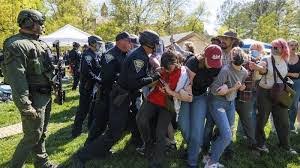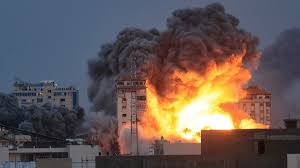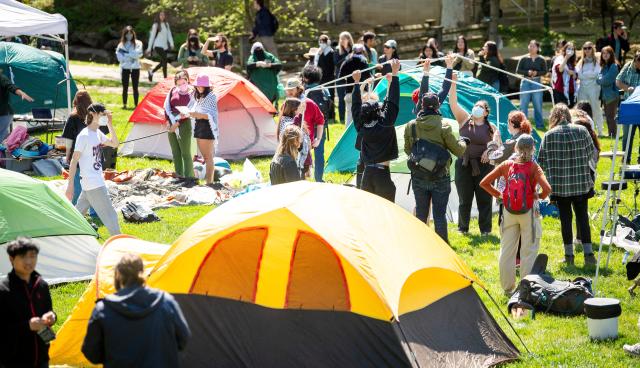
BLOOMINGTON— The IU Board of Trustees is considering implementing a policy to increase restrictions on those who want to hold demonstrations on IU campuses.
Some students believe the new policy being considered by IU infringes on their right to speak freely.
If approved on July 29, the university would regulate signs and prohibit overnight camping for demonstrations in the future. If passed, the policy will be implemented on August 1, 2024.
On October 7, 2023, Hamas launched an attack on Israel, leading to a series of events that sparked protests and controversy around the world, including at colleges and universities in the United States. For many at Indiana University and throughout the country, the October 7th attack and the following events enflamed deep emotions, passions, and divisions.

Those divisions increased at IU University campuses between October 2023 and April 2024 as a result of a series of incidents and events that were perceived as antisemitic or Islamophobic. Many students at IU and around the country feared for their safety. They expressed concern that they could be targeted for harassment or harm as a result of their ethnicity or religion.
In early 2024, pro-Palestinian students and others at IU began protesting the conflict in Gaza by disrupting campus tours, interfering with campus events and guest speakers, and protesting in portions of campus buildings. In the spring of 2024, across the country, pro-Palestinian students established encampments on university property at hundreds of institutions, ultimately leading to more than 3,000 arrests.

On April 24, 2024, IU’s leadership learned that pro-Palestinian protesters, newly organized under a group not affiliated with IU, intended to establish an indefinite encampment the following day in Dunn Meadow, a historic space for expressive activity at IU’s flagship Bloomington campus. IU’s leadership reviewed the IU Bloomington policy designed to regulate expressive activity in Dunn Meadow — which permitted tents until 11 p.m. — and determined that the policy was outdated and unclear. That policy permitted the administration to establish a committee to issue further guidance on the policy in emergent situations. IU’s leadership was concerned about the safety and security risks of an encampment and the potential for significant disruption to the University’s operations. While they hoped the situation could be de-escalated short of law enforcement involvement, IU’s leadership believed preventing an encampment would be better than taking one down. Removing an encampment (if necessary) during daylight instead of at night would be safer. Against this backdrop, IU’s leadership elected to convene an ad hoc committee, which then modified the Dunn Meadow policy that evening to prohibit the installation of structures, including tents, without advance approval.
The next day, protesters established an encampment in Dunn Meadow. When IU administrators informed them of the new policy, distributed fliers about it, pointed to signs notifying them of it, and asked them to take their tents down, the protesters argued that the school policies permitted the structures, pointing to the old policy that remained on IU’s website.

Over several hours, protesters were told dozens of times that they could stay to protest at Dunn Meadow but had to remove their tents. While some disassembled their structures, many refused to comply.
The IU Police Department lacked adequate staffing or the specialized training to respond to a significant protest event in an increasingly volatile setting. It sought the assistance of the Indiana State Police to remove the encampment.
Protesters, at times, circled the structures, physically blocking their removal. ISP then arrested 34 individuals and removed the encampment structures. The next day, students at Indiana University Indianapolis also established an encampment, and the encampment at IU Bloomington was reconstructed.
On April 27, 2024, after additional warnings, ISP removed the IU Bloomington encampment again, raising the total to 57 arrests. Later that same day, protesters reconstructed the encampment.

The encampments at IU Bloomington and IU Indianapolis remain in place as of the publication of the independent report. At any given time, the number of protesters in the encampments is between one and a dozen.
The IU Bloomington encampment has attracted several unhoused individuals with no IU affiliation. Over the summer, one unhoused individual experienced a drug overdose in the encampment, while another living in the encampment had a lengthy and violent criminal record.
Although several student organizations and university groups have reserved Dunn Meadow for events throughout the upcoming school year, the current encampment precludes any other use of it.
In June 2024, IU’s Board of Trustees proposed a new, university-wide expressive activity policy and solicited comments from stakeholders. The board plans to consider adopting the policy before August 1, 2024.
In June 2024, IU engaged a law firm, Cooley LLP, to conduct an independent after-action review of the protest and encampment events at IU in April 2024, including the University’s applicable policies and processes.
The report details a review of events and sets forth recommendations for IU’s consideration, consistent with IU’s commitment to making the report’s results transparent and public.
This policy will be up for a vote on July 29. If passed, it would be implemented on Aug. 1.
When asked for a comment, the university referred back to the release given on Thursday about the report.
Copyright 2024 Nexstar Media Inc. All rights reserved. This material may not be published, broadcast, rewritten, or redistributed.



